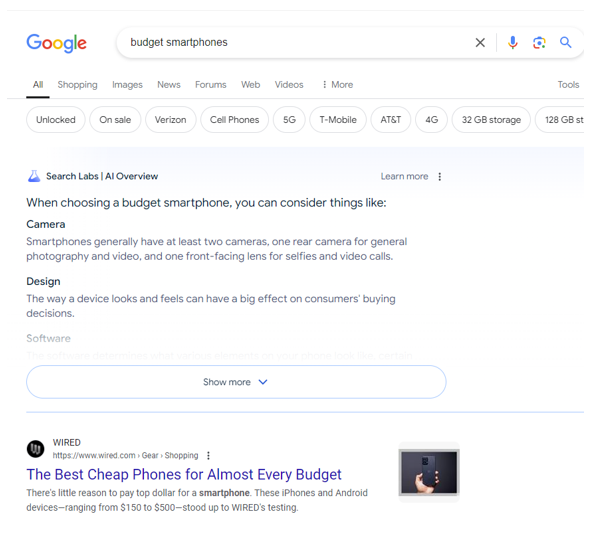SEO Insights: July 2024 Report

Back in May, Google began showing AI Overviews (AIO) in search results. AIOs are Google’s AI generated responses to search queries.
The initial roll out was for English language queries in the US, but we are now also starting to see these appear in the UK. When Google announced that AIOs were coming to search, we knew that this would definitely have an impact on organic search traffic, as the overviews push the organic results further down.
Here is an example of how it appears in the search results:

The blue area above the first search result is the AI overview. There is an option to “Show more” to expand it and it will often include links to websites as resources, and products and images if relevant.
This does not appear for all search queries at present, and current estimates put the figure at less than 20% of all searches (down from 84% when it was first introduced).
However, whilst monitoring US searches, we can see that over the last 3-4 weeks, the appearance of the overviews has increased and is definitely negatively impacting organic search traffic.
Why has Google started showing AI Overviews in search?
Principally, Google began planning the AI Overviews following the threat from AI chatbots such as ChatGPT and Bing Chat. Their sudden popularity forced Google to accelerate the introduction of an AI-type assistant in its search results.
However, Google being such a dominant platform for search, and trusted worldwide to provide reliable and accurate search results, they had to cautiously release it to the public to ensure that the AI wasn’t just making things up.
It has certainly had its hiccups, such as suggesting you use glue to stick cheese to Pizza (!) but in general it appears to work reasonably well.
The cynics out there may look at this slightly differently…
With AIOs, the user is likely to stay longer in the search results, without clicking away. This increases the likelihood that they may click on an ad…Google’s ultimate mission!
It is also a way for them to control the narrative. They need to rely less on specific websites and more on the ability of the AI to determine what is and isn’t correct and useful (even though it needs third party websites to get the information it needs in the first place!) But we won’t discuss the moral implications of this here.
There is also the factor of Google not being ultimately all that great on its own at determining what are the best results for a specific search query. We know that it actually uses user click data to refine the results, promoting the websites that appear to get more clicks from users for the search query.
What impact are we seeing so far?
One of my personal websites, which generates significant traffic from the US and is targeted to the gift market, has seen a nearly 50% reduction in traffic since AIOs started appearing for many organic search traffic generating keywords to the website.
Organic rankings have been mostly stable, although many of the key search terms have even improved, but the AIOs are definitely reducing the number users that click on the search results below.
This is happening now across many industries and affecting many websites. We can see that their traffic is starting to decline as an increasing number of their search terms are generating AIOs.
Observing the US search results, they are also a lot “noisier” than their equivalents in the UK, with more additional elements such as “People also ask”, “People also search for”, products, images, videos, forums, Reddit, etc., all making the search results very busy.
This too is adding to the overall loss in organic search traffic and many of these setups that we can see in the US, will make their way into the UK results over the coming weeks and months.
The negative effect of all of this is real and we have experienced it first-hand.
Is it time to panic?
Yes and no! Yes, it’s happening and fast, but also no, it’s not all bad. AIOs are already appearing in the UK, and we do expect them to appear for a broad range of search terms. However, as with any change that Google introduces, there are always winners and losers.
We have been observing and monitoring the US search results since AIOs rolled out in May and we have identified the key risks and opportunities associated with them. It has also given us time to determine the best strategy to adopt going forward that will benefit our clients during this quite significant change in how Google delivers its search results.
AIOs are here to stay and will likely become increasingly prominent with time. We are already adapting strategies for clients in line with how these are appearing for their key search terms.
AI is changing search for the future and as we have always done, we’re ready to make the most of the opportunities for out clients and ensure that they still succeed in this new and exciting era of search.

